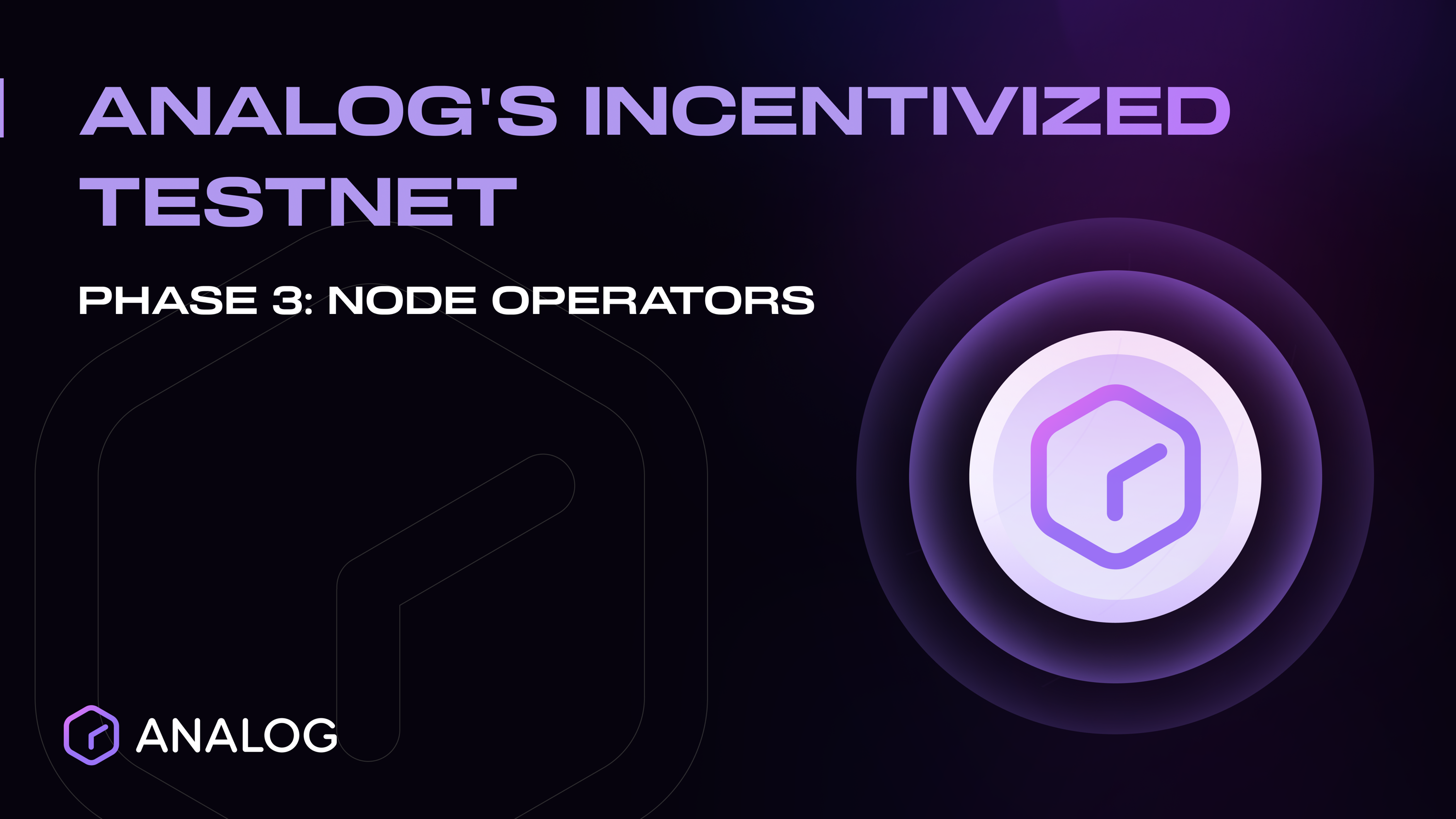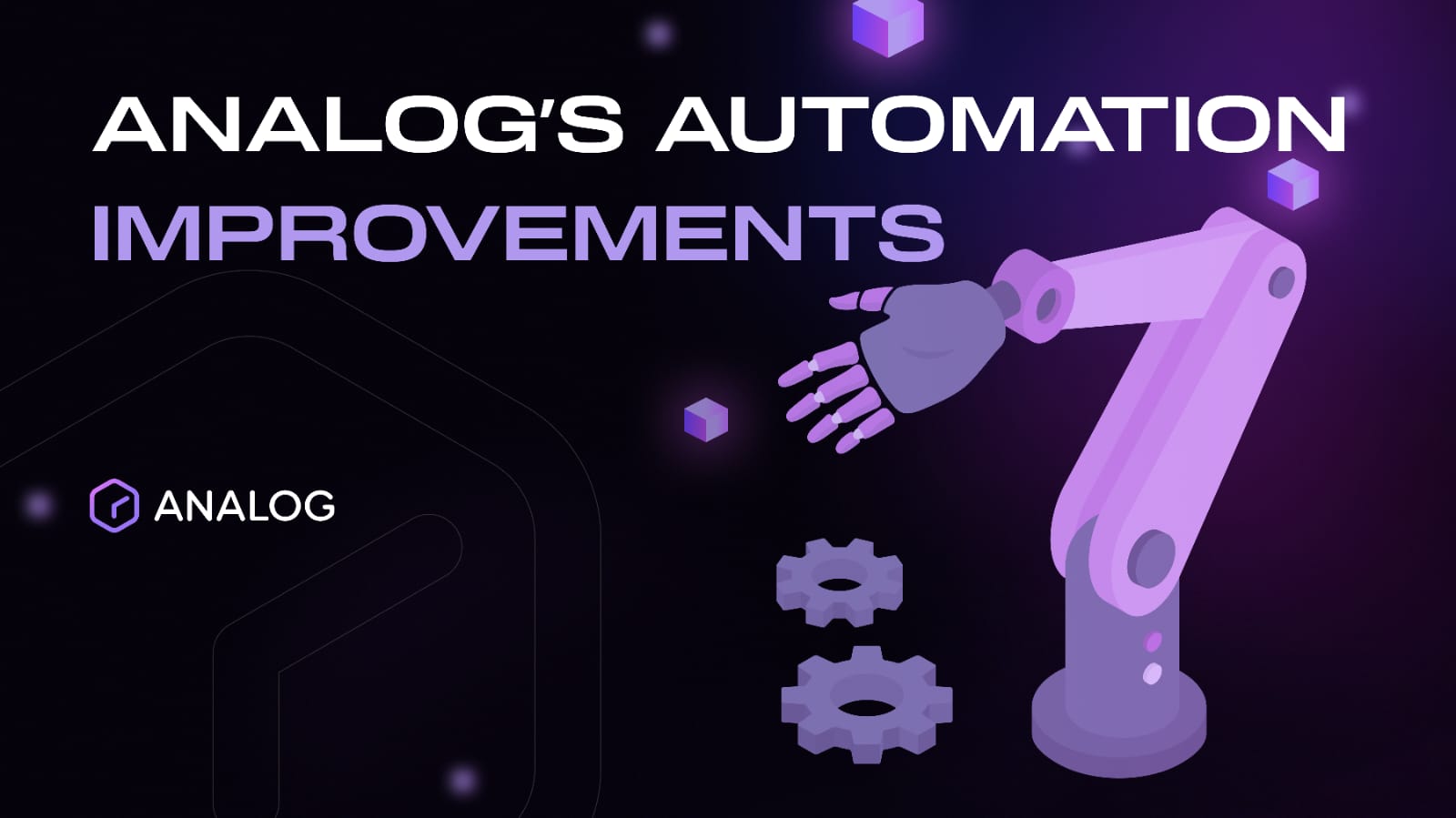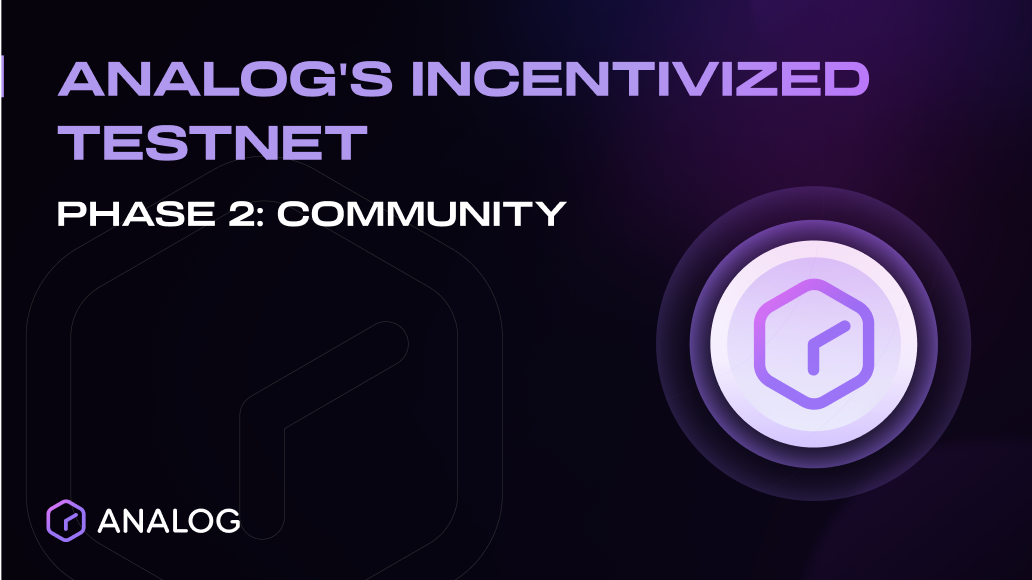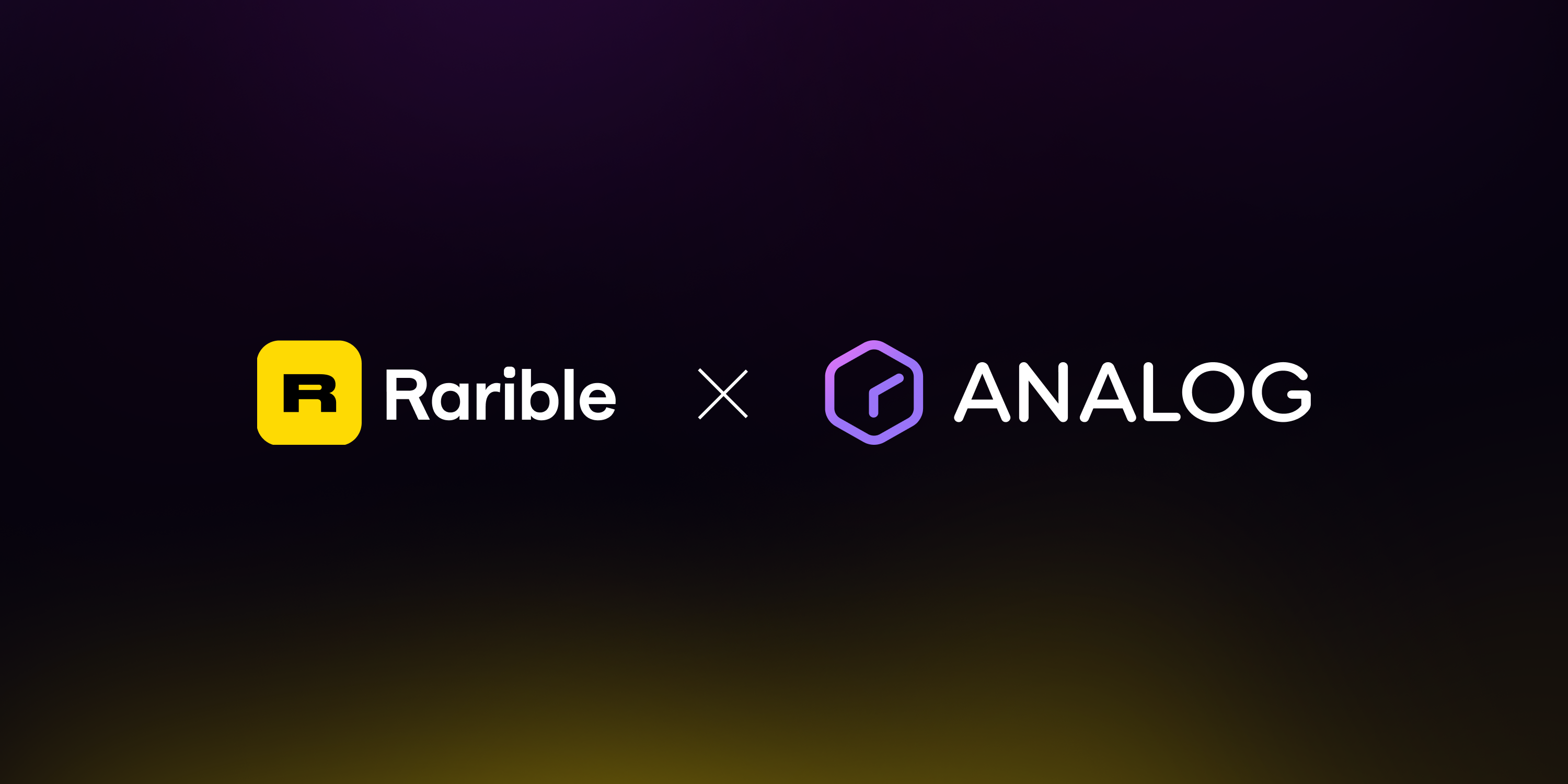
Become a Time Node operator on the Analog Network and shape the future of blockchain interoperability.
We’re thrilled to announce the launch of Phase 3 of Analog’s Incentivized Testnet, specifically designed for node operators. This is a significant step towards developing Analog, a one-stop-shop blockchain interoperability platform that addresses multi-chain and cross-chain challenges in Web3.
For this phase, we’re initially seeking participants with a strong understanding of running and managing validators/nodes for Substrate-based blockchains. As withPhase 1 and Phase 2, you’re invited to participate in Phase 3 by completing quests on our Incentivized Testnet App.
We’ve structured Phase 3 of our Incentivized Testnet into 2 chapters as follows:
Chapter 1 (Whitelisted Node Operators): Only whitelisted Time Node operators can participate in this phase. This Chapter will run from the end of May 2024 to the end of July 2024. (We are here!).
Chapter 2 (Public Node Operators): Anyone will be able to participate as a Time Node operator without being whitelisted. This Chapter will take place later (post-mainnet).
Analog will reward approved and eligible node operators who actively contribute to this Testnet with ANLOG tokens via an airdrop mechanism. By participating, you not only contribute to the development of Analog but also stand a chance to earn ANLOG tokens. The exact details of Chapter 2 and the nature of incentives and timelines for the ANLOG airdrop will be announced later.
Chapter 1: How to Participate as a Time Node Operator
Chapter 1 of the Incentivized Testnet program is soon starting! The main goal of this Chapter is to onboard a robust community of node operators, which will allow us to bootstrap the Testnet without outages and test the Timechain tooling.
If you're ready to join us as a Time Node operator, the process is simple:
Setup your Testnet wallet: Generate a new wallet by following our guide. Once created make sure you fund your wallet using our Testnet Faucet.
Fill out this form to join the waitlist: Due to certain restrictions, Analog will not onboard node operators from certain jurisdictions, and all participants will be required to complete KYC/KYB procedures. Learn more about eligibility criteria here.
Await approval: Our team will review your application and notify you of your status.
Set up and register your Time Node: Once approved, check out this guide to learn more about setting up and registering your Time Node. It will guide you through how to install the necessary software and register your validator on-chain.
Follow the quests and check your score: Trigger your payouts on time and make sure your validator is always online and up-to-date to maximize your reward.
Why Participate In this Program?
Participating as a Time Node operator on the Incentivized Testnet offers numerous benefits, including:
Early access to the Analog ecosystem: You’ll get to start authoring blocks on the Analog Network and its ecosystem before it officially launches.
Earn Rewards: You’ll receive rewards from minimum 2% of total token allocation, which is earmarked for the ANLOG airdrop. Receive incentives for your active participation in the testnet.
Support a growing ecosystem: Contribute to the development and testing of Analog.
Gain technical experience: Expand your knowledge of blockchain technology and network operations.
Shape the future: Help us refine and optimize our protocol before its official launch.
Analog’s Nodes
There are two categories of validators on the Analog Network: Timechain Nodes, or simply Time Nodes, and Chronicle Nodes. Time Nodes are the core validators on the Timechain, securing the network through our Nominated Proof-of-Stake (NPoS) consensus mechanism. To participate, they must stake a specific amount of $ANLOG tokens. Other token holders can also join in the consensus by nominating Time Nodes to represent them.
Chronicle Nodes, on the other hand, bridge the Analog Timechain with external blockchains. They monitor and verify specific events or transactions on other chains and report them back to the Timechain. This communication enables seamless cross-chain interactions and interoperability across different blockchain networks.
Check out our Timepaper to learn more.
Recommended Specifications and Node Setup
Check out “Running a Timechain Node” to learn more about recommended specifications and node setup processes.
Rewards
Like the previous phases, the Testnet will feature a menu of incentives that encourage and reward meaningful participation. Analog has allocated a minimum of 2% of the total ANLOG supply for this program, and node operators who complete the required validator quests will receive a portion of these tokens. The exact allocation will be based on how many token rewards each individual validator was able to earn during the incentivization phase. These tokens will be unlocked immediately upon a successful mainnet launch.
Note that the Terms and Conditions govern all participation and rewards. There are three basic validator quests you’ll be expected to complete in this Chapter:
| Quest/Tasks/Duration | Tasks |
|---|
| Time Node Setup | - Generating wallet address
- Generating session keys
- Starting a validator (Timechain) node
- Submitting whitelist request
|
| Running/Maintaining Time Node | - Running a validator in a unique location or region
- Ensuring the Time Node is always online
- Triggering payouts regularly
- Ensuring the Timechain node is always up-to-date
|
| Additional Tasks | - Providing feedback
- Contributing infrastructure tooling to the ecosystem (e.g., devtools, scripts, etc.)
- Contributing towards documentation specific to validator operations
- Contributing usability content
|
When the mainnet launches, Analog will mint and issue a fixed number of tokens as staking rewards/yield to Time Node operators whenever they author a block on the Timechain. The staking yield numbers will initially be generated using an 8% inflation rate, which will be subject to changes through an on-chain governance mechanism (to be introduced later).
For more details, check out the Tokenomics Paper.
About Analog
Analog is building a suite of blockchain interoperability protocols to tackle multi-chain and cross-chain issues in Web3. At the heart of the Analog Network is the Timechain, a sovereign, Substrate-based blockchain maintained by a dynamic, decentralized set of validators consisting of Time Nodes and Chronicle Nodes.
Analog has already launched two products on top of the Timechain: Analog Watch, a simple and powerful Web3 data provider solution, and General Message Passing (GMP) protocol, an interoperable cross-chain smart contract call execution protocol that unlocks composability within the Web3 space.
Follow Analog on X and join our technical team on @OneAnalog and join our technical team on Discord and Telegram to stay updated about Analog’s Incentivized Testnet. [Discord channel: #validator-support]










